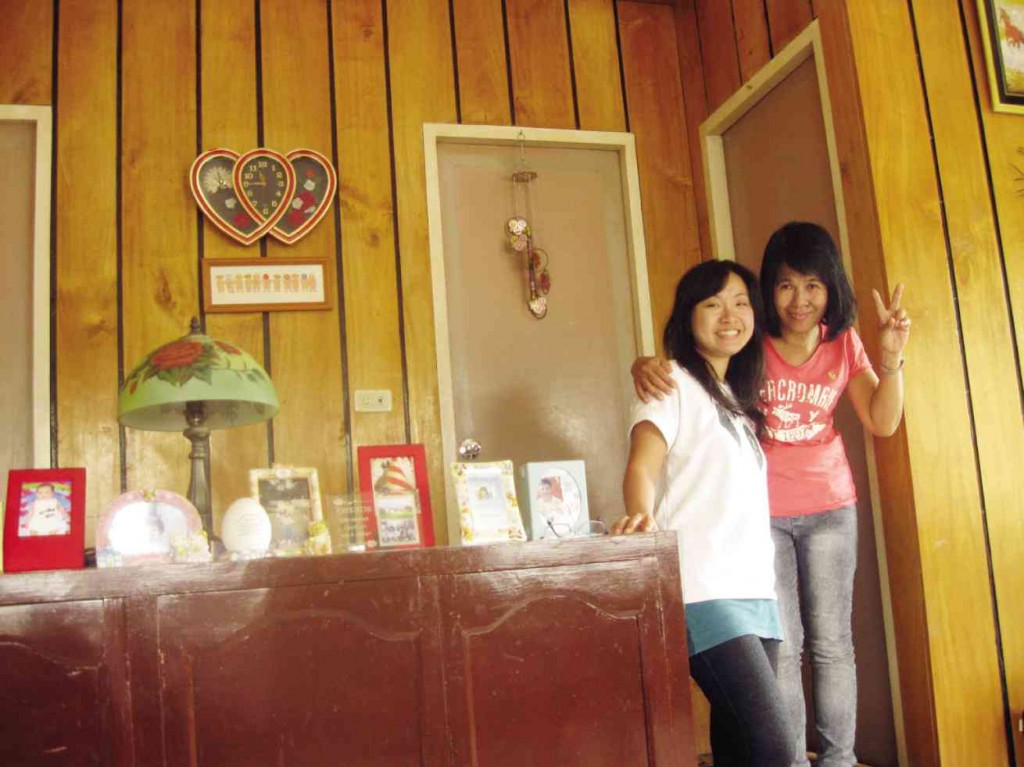Everyone has a story. Helen Mahimpit has hers, too. When she left Taiwan after 20 years of domestic work—much of it as an overstaying, undocumented worker—she came back to a newly-built three-bedroom concrete house.
It was on a lot she had purchased by a barangay road in Nabunturan, Compostela Valley. Her old family house was in the downtown poblacion area, but she chose to build her own residence in close proximity to the more than four hectares of ricefields she had also purchased from her accumulated salary abroad.
“This is my life now, a bit boring because I’m usually just at home,” shares Ate Helen.
She spends time tending to her potted plants. Unlike before, she no longer has to bathe and feed two dogs left to her care by a Taiwanese employer. She no longer has to take on part-time cleaning jobs in uptown condominiums. She doesn’t have to do all the things she used to do because this time, it’s reaping season for her.
The biannual harvest in her rice field and the monthly rent of a small two-storey commercial space she had constructed in the poblacion sustain the daily living expense for herself and her 26-year-old son who recently returned from a 10-month contract in a restaurant in Singapore.
“If my son can’t go back to work abroad, we may just set up a piggery beside my fruit farm in the poblacion,” she muses, her strong entrepreneurial spirit showing through.
Unreliable husband
I met Ate Helen in Taiwan and visited her recently in her provincial home. After she left, I sent her a small package of Chinese goodies—instant milk teas, crackers, and snack foods which I knew she liked and would miss. The box never reached her. I had written the wrong name. To her employer, to her international church family, and everyone else who knows her in Taiwan, she was Helen, too. But it turned out Helen was not her real name.
Ate Helen first left for Taiwan to become a caretaker. She didn’t have any business streak, only a drive for success born out of necessity. “I knew I had to go abroad because I couldn’t rely on my husband to support me and my son,” she shares.
She left knowing that she would have to fend for her family and she knew all too well the stories of other OFWs who worked tirelessly only to come back still empty-handed.
Overstaying worker
But shortly after she was employed, the old man whom she was taking care of died. The restrictions in the 90s required her to leave the country, automatically ending her contract. At that time she had hardly any savings and even owed money for her placement fee. She decided to stay on as an undocumented worker.
When she decided to overstay, she changed her name so she could still travel back and forth from Taiwan and the Philippines. The plight of Ate Helen is a familiar plotline to many undocumented workers all over the world whose stories are marred by economic desperation, legal impediments, and personal battles.
With her fake name, she got jobs with other employers. In fact, life in Taiwan became beautiful for Ate Helen. With her last employer, she was provided with a rooftop residence. Holidays were spent in tourist spots, beaches, nature parks, or just around the city with friends. Every Sunday, she attended an international church with an active Filipino community.
But two years ago, she decided it was time to come home.
Independence, security
She no longer had a husband to come home to as he had started another family while she was away. But she was convinced that life was not about endless toiling and living abroad. Luggage in tow, she and a fellow overstaying OFW went to the consulate and surrendered to the authorities. She was fined and detained at the immigration center for three weeks. The ordeal dampened her spirit, but it only made her decision to come home stronger.
Ate Helen says she is home for good. While the fellow OFW who came home with her left again to work in a Middle Eastern country, Ate Helen has no plans to work abroad “Hindi na siguro, dito nalang ako, OK naman dito.”
In each and every story is a timeline of complex plotlines. Ate Helen, crawled out of her provincial paralysis and found new confidence and success abroad. She was able to earn her own money, setting aside some savings. But at the same time, she risked traditional family bonds. The experience challenged her will. “Our God is great, I’m wearing a crown of God’s favor,” she shares.
At 58, she doesn’t plan to go through the same ordeal. She took the risks to secure herself a better life. It’s time to harvest the fruits of her long overseas journey.


